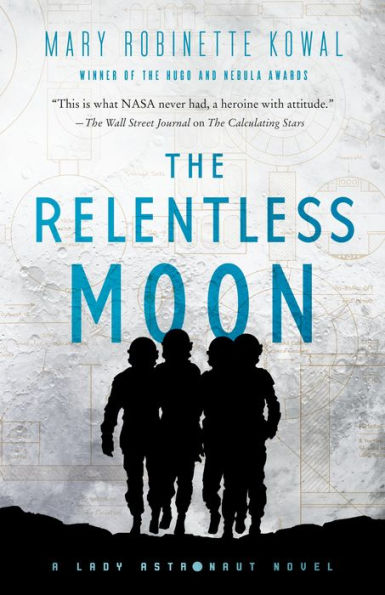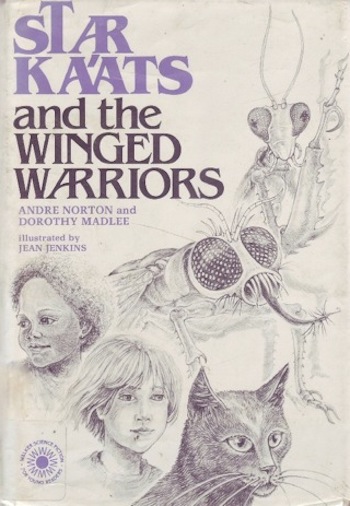This final published volume in the Star Ka’ats series reads more like a continuation than a conclusion. Young humans Jim and Elly Mae are well settled in with the telepathic alien Ka’ats. But not everyone on the world of Zimmorra is happy. A few of the cats who were rescued from Earth before it presumably exploded into nuclear war have not taken well to the Ka’ats’ laws and culture.
One cat in particular, Boots, whom Jim rather likes, sneaks off to hunt, which is a major crime among the Ka’ats. Jim catches him and frees his mouselike prey, and warns him against breaking the law. Boots is not a happy cat, and he has no desire to stop hunting. Hunting is what he is.
This is a general crisis, but there may be a solution. Thanks to the metal the humans helped the Ka’ats find and manufacture, the Ka’ats and their robots have built a spaceship. They plan to head back out among the stars and find lost Ka’at colonies.
Alien worlds, the Elders think, may need skills and personality types that have become liabilities on peaceful Zimmorra. In short—Earth cats, hunters and warriors like Boots. And human kids, too, with their insatiable curiosity and their very useful opposable thumbs.
Jim and Elly Mae and their Ka’at kin-friends Tiro and Mer join a small crew of Ka’at engineers and cat volunteers including Boots. Their mission is to find out what happened to a colony last heard from a long, long time ago. They have an ancient but still viable navigation tape and enough information to know that the colony established a spaceport and a message beacon.
The voyage takes an unspecified length of time, which the crew spend in suspended animation. It’s not important anyway. What’s important is that when they arrive on the planet, it’s not what they expected at all. It’s covered with gigantic, forest-tall grass and, they quickly discover, inabited by equally gigantic insects. One, a stink beetle as big as Jim, sprays Jim and Boots with painful toxic discharge.
Buy the Book


The Relentless Moon
That’s just the start. Giant wasps, giant mantises, giant dragonflies and moths and spiders, make the planet incredibly dangerous. And there’s no sign of the colony, though they find the beacon in ruins, looking as if it has been attacked with flamethrowers.
They do eventually find survivors, and an answer to the mystery of the giant insects. The colony has taken refuge in caves, and life on the planet has changed them. They’re warriors and hunters, and it’s actually difficult for the Ka’ats to communicate with them telepathically. But the cats, including Boots, have no trouble with that at all.
The insects are basically an accident. An alien ship crashed, and the energy it emitted caused the native insects (and grass, evidently) to become gigantic. As with the Hsi city and the sea city in previous volumes, Jim and Elly,and their handy hands help to shut down the rogue machine and save the world.
The colonists have no desire to go back to Zimmorra. This is their home. The cats want to stay with them; their warrior culture is a good fit, and the cats’ hunting skills are needed and welcome. It’s a good solution, and everyone is happy with it.
Jim and Elly don’t make as clear a choice as Boots and the other cats, but it is a choice: to stay with their Ka’at friends and presumably keep helping them as they travel around the universe. There’s plenty of room for further adventures, and no sense that the series is finished.
I’m kind of sorry there weren’t any more volumes published, though the plots had become pretty formulaic. Misfit from earth has problems with Ka’ats, kids (and misfit if it’s not actually the kids) go off on a mission to save Ka’ats, old but not dead tech is doing awful things to the world around it and has to be shut off, kids are instrumental to making it happen. There’s always an interesting wrinkle—robot city, plant people, giant insects—and an engaging adventure, and the Ka’ats can’t get the job done without the kids.
That’s a perfect middle-grade setup. Kids without adults have exciting adventures, fight scary enemies, and save the world. With special bonus big friendly (but by no means cute or fluffy) kitties. In space.
I like it that the worldbuilding keeps answering questions I’ve had throughout. The issue of hunting is complicated, and this entry in the series goes into some detail about it. Ka’ats have consciously chosen to stop hunting and live on fruits and vegetables and artificially constituted fishlike protein. For cats like Boots, this cuts to the heart of what a cat is. Cats are hunters. Life isn’t worth living if they can’t hunt.
Personally I don’t buy the Ka’ats’ side of the issue. It’s human mores imposed on a nonhuman species. In reality, cats are obligate carnivores, and the Ka’at diet would kill them. Boots is right: cats are hunters. They have to hunt, and eat meat, to live. They can’t survive on a vegetable diet, and diets too heavy in plant material can cause problems.
But that’s not what these books are about. They have a moral underpinning, as children’s books often do. Making the Ka’ats space aliens helps a bit—so maybe cats really did change that profoundly on Earth, turning into near-pure carnivores. And maybe the original species was more omnivorous. Why not?
I haven’t talked about the fact that these novels are a collaboration—deliberately. I wanted to save it for the end. What’s really interesting is that it’s not obvious who did what. The melding of talents is just about seamless. At least from the evidence of the finished product, Norton and Madlee worked really well together, and their sense of story and character and worldbuilding seems to have been quite similar.
Some things seem a bit smoother than usual. The kids’ personalities have a hair more depth and roundness than Norton characters tend to have, and there’s a bit of moralizing at the end, about getting along with each other and fitting in in one’s world, that isn’t usually so clearly stated in Norton’s works, though the themes themselves are frequent and pervasive.
The series is certainly full of Norton tropes and favorite settings and themes. Tiny, crowded spaceships. Star travel in suspended animation. Lost planets full of monsters. Ancient, inimical technology hidden in ruins. Caves. Cats, and animal companions in general. Orphan protagonists with no place in their world until their pluck and bravery makes one for them. Humans inevitably blowing up their planet and leaving a wasteland behind. Wiser, nonhuman aliens doing what they can to save what can be saved.
I like it. It works for me. It was fun to revisit the Ka’ats, and I especially like the Plant People. They’re well up there on my list of favorite Norton (or maybe Madlee, but still) aliens.
Next time I’m off to something different, one of Norton’s rare Westerns: Stand to Horse, from 1968.
Judith Tarr’s first novel, The Isle of Glass, appeared in 1985. Since then she’s written novels and shorter works of historical fiction and historical fantasy and epic fantasy and space opera and contemporary fantasy, many of which have been reborn as ebooks. She has even written a primer for writers: Writing Horses: The Fine Art of Getting It Right. She has won the Crawford Award, and been a finalist for the World Fantasy Award and the Locus Award. She lives in Arizona with an assortment of cats, a blue-eyed dog, and a herd of Lipizzan horses.










